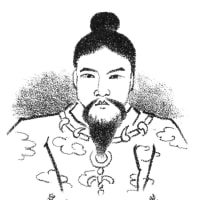『日本書紀』欽明天皇 33
夏六月、詔曰「新羅、西羌小醜、逆天無狀、違我恩義、破我官家、毒害我黎民、誅殘我郡縣。我氣長足姬尊、靈聖聰明、周行天下、劬勞群庶、饗育萬民、哀新羅所窮見歸、全新羅王將戮之首、授新羅要害之地、崇新羅非次之榮。我氣長足姬尊於新羅何薄、我百姓於新羅何怨。而新羅、長戟强弩、凌蹙任那、鉅牙鉤爪、殘虐含靈、刳肝斮趾、不厭其快、曝骨焚屍、不謂其酷。任那族姓、百姓以還、窮刀極爼、既屠且膾。豈有率土之賓・謂爲王臣、乍食人之禾・飲人之水、孰忍聞此而不悼心。況乎太子大臣、處趺蕚之親、泣血銜怨之寄、當蕃屏之任、摩頂至踵之恩、世受前朝之德、身當後代之位。而不能瀝膽抽腸・共誅姧逆・雪天地之痛酷・報君父之仇讎、則死有恨臣子之道不成。」
≪英訳≫
In the sixth month of summer, an imperial decree stated, “Silla (新羅) is a nation to the west that is rather humble and insignificant. It defies Heaven, acts lawlessly, repays our kindness with betrayal, and has destroyed our official holdings (官家). Silla has harmed our people and damaged our lands and districts. Empress Jingū (神功皇后) was wise and traveled throughout the realm, caring for and nurturing the people. When Silla found itself in hardship and sought her protection, she took pity on them.
She safeguarded the Silla king (新羅王) from near execution and granted Silla lands with natural defenses, elevating them to an extraordinary level of prosperity.
Did Empress Jingū treat Silla with any form of neglect? Our people also bear no particular grudge against Silla. And yet, Silla has attacked Mimana (任那) with long spears (長戟) and powerful crossbows (強弩). Like a beast with large fangs and curved claws, they have brutalized the people of Mimana, cutting open their bodies, severing limbs, exposing bones, burning corpses—without any remorse whatsoever. Mimana, both high and low, has been entirely devastated. Under the protection of the royal realm, as ministers serving the king and sustained by the harvests and waters of the people, how could we hear of these events and not feel deep sorrow?
The Crown Prince and ministers, bound by a shared loyalty, suppress their tears of blood and endure their grievances in silence.
Those in high positions suffer hardship, enduring trials for the sake of their responsibilities.
Having received the virtue of past emperors and inherited the world of later generations, even if it means sacrificing their very hearts and spirits, they must suppress treasonous acts, alleviate Heaven and Earth’s suffering, and avenge the wrongs done to their lord and father. Otherwise, even in death, they will carry the shame of failing in their duty as children.”
≪この英文の和訳≫
夏の六ヶ月目、天皇は詔を下されました。「新羅(しらぎ)は西方にある、小さく取るに足りない国である。彼らは天に逆らい、法を守らず、我が国の恩義を裏切り、官家(みやけ 直轄領)を破壊した。また、新羅は我が民に危害を加え、我が国土と郡を損なった。神功皇后(じんぐうこうごう)は聡明であられ、全国を巡行し、民を慈しみ、よく養われた。新羅が困難に直面し、皇后に助けを求めたとき、皇后は哀れみをもってこれを助けられた。新羅王(しらぎおう)が処刑される寸前でその命を守り、要害の地を授け、新羅を並み外れた繁栄へと導かれた。 神功皇后が新羅に対して冷淡であられたであろうか。我が民もまた、新羅に対して特別な恨みを抱いているわけではない。それにもかかわらず、新羅は長戟(ながきほこ)と強弩(つよきゆみ)で任那(みまな)を攻撃し、獣のように大きな牙と曲がった爪で任那の人民を虐げた。足を切断し、骨を晒し、屍を焼き、それでも何の良心の呵責も持たなかったのである。任那は上下ともに完全に荒廃した。王土の庇護のもと、王に仕える臣下として人民の収穫した穀物を食べ、水を飲む身でありながら、これを聞いて痛まぬ者があろうか。太子と大臣らは共に忠誠を誓い合い、血の涙を抑え、耐え忍んでいる。高位にある者は苦難に身を投じ、責務のために試練に耐えている。先帝の徳を受け、後の世を引き継いでいる以上、たとえ自らの胆や腸を犠牲にしようとも、反逆を抑え、天地の苦しみを和らげ、君主である父の仇を討たねばならぬ。そうでなければ、死後もなお、子としての道を尽くせなかったことを恥じることとなろう」。
令和6年11月6日(水) 2024













